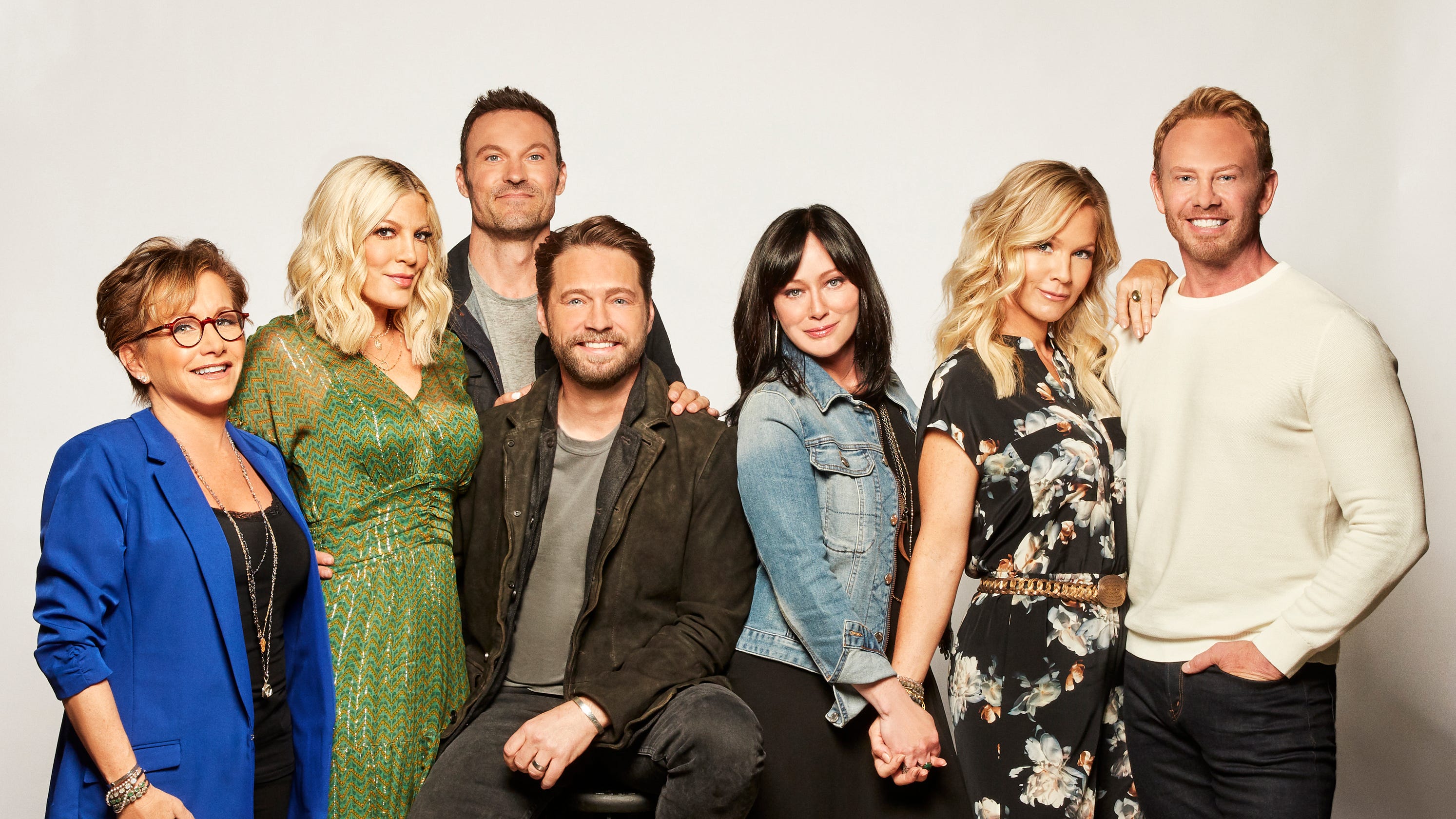Strength & Resilience Through Turmoil
- As Shannen Doherty, 52, battles breast cancer amid her divorce from long-time husband Kurt Iswarienko, it’s great to see the actress has her maintained friendships and optimism despite the challenges she’s been through.
- Doherty was first diagnosed with breast cancer in 2015. It went into remission in 2017 but returned as stage 4 (or metastatic) in 2019. Metastatic cancer means the disease has spread to distant areas of the body, like the bones, liver, lungs, or brain.
- This year, her continued battle with cancer involved surgery and radiation.
- Resilience is an important trait to have in the face of adversity such as cancer. SurvivorNet spotlighted this important cancer-fighting trait in the film “Resilience,” now streaming on SurvivorNet. It follows the lives of three athletes who are living with a health challenge yet overcame adversity.
In the case of 52-year-old actress Shannen Doherty, who is fighting stage four breast cancer amid divorce from her long-time husband Kurt Iswarienko, it appears her admirable strength may be stemming from experiences she had early on in life, like the off-camera tension she had with one of her “Beverly Hills, 90210” costars.

“I can only remember one incident, and that was when, yeah, we took it outside.”
When question on whether the altercation “got physical,” Garth said, “Year, I’m a midwestern girl and I spent some time in Glendale, Arizona, and so, that makes me tough.”
Garth pointed out how neither of them “won” the fight and they had to be held back by their male costars, eventually admitted that the fight took place after she and Doherty were “teasing” each other and Doherty pulled her skirt up.
“But we’re just both very strong Aries women, we don’t back down, no matter what,” Garth added.
Garth also previously spoke about the a toxic environment on the set of the famed 90s show.
Speaking on an episode of fellow actress Tori Spelling’s “90210MG” podcast, Garth said, “I wish that Brenda would have stayed on the show. I don’t know where they were gonna go with her character.”
Spelling chimed in, “The energy became toxic on set. I’m not saying she [Doherty] made it toxic, just from everything going on. So it did need a break.
“But yet, if we had taken a breather, and everyone had calmed down and sorted out, it would have been really nice to have Brenda come back.”
Aside from her off-screen drama, Doherty was first diagnosed with breast cancer in 2015. It went into remission in 2017 but returned as stage 4 (or metastatic) in 2019. Metastatic cancer, for which there is no cure, means it has spread to distant areas of the body. In Doherty’s case, the cancer has spread to her brain.
Despite the tough times and undergoing surgery earlier this year, Doherty appears to be thriving in life as she often takes to social media to show her travel adventures and enjoyable memories made with friends.

Later this week, Doherty will be reuniting with her 90210 castmates for a “90s Con” event in Florida.
According to E News, “Beverly Hills 90210” alums including Tori Spelling, Jason Priestly, Jennie Garth, Brian Austin Green, Ian Ziering, and Gabrielle Carteris are expected to join Doherty in Tampa for the Sept. 16 and 17 meet-and-greet sessions in Tampa, Florida.
It’s great to see Doherty has maintained her friendships through the challenges and disagreements she’s endured. We’re also delighted to know that Garth offers continued support for Doherty amid her cancer battle.
More Inspiring Stories About Resilience
- Breast Cancer Survivor Jane Fonda, 82, Embodies Resilience And Strength As Elle Magazine’s April Cover Model
- Cancer Survivor Abby Lee Miller Embodies Resilience, Teaches Dance Classes From Hospital Room: “I Won’t Let The Pain Tarnish My Smile”
- Dancing in the Rain: Osteosarcoma Survivor Sona Kocinsky’s Story of Bravery, Resilience and Hope
- Resilience: Staying Positive Despite Adversity
- SurvivorNetTV Presents: Resilient — Learning to Overcome
Back in June, DailyMail.com spotted Garth on an errands run in Los Angeles, where she said, “Obviously. Whatever she needs,” when asked about her being there through Doherty’s cancer fight.
Prior to that, 2008, Doherty told Entertainment Weekly, “I think when you’re 18, your personalities conflict, and then you meet up 10 or 15 years later and the playing ground is totally different and you’re fine. The first moment I saw her it was like, ‘OK, this is going to be good.”

Doherty added, “It was like, ‘Hey.’ Then a hug. It’s like going to a war together. You’ve already been in the trenches together.
“You learned so much from that first war. That second war, you know what you need to do to make the set the most peaceful environment you can possibly have.”
Shannen Doherty’s Health Battle
Shannen Doherty was first diagnosed with breast cancer in 2015. It went into remission in 2017 but returned as stage 4 (or metastatic) in 2019. Metastatic cancer means the disease has spread to distant areas of the body, like the bones, liver, lungs, or brain.
This year, her continued battle with cancer involved surgery and radiation.
Earlier this year, the actress shared a handful of photos and videos of her getting prepared for radiation treatment on her head. During radiation, high-energy beams are aimed at the location doctors believe cancer cells to be. The MRI helps doctors pinpoint the exact location of the tumor within the skull.
She also underwent a craniotomy brain surgery where doctors worked to remove cancer from her brain.
“We take off the bone overlaying the area we need to get to. We open the little envelope around the brain called the dura and then we move through the brain tissue to get to where the tumor is to try to cut out as much as we can safely without hurting the patient’s function or other important things like big blood vessels that can cause things like a stroke,” neurosurgeon at Emory University School of Medicine, Dr. Kimberly Hoang, told SurvivorNet in a previous conversation.
Metastatic breast cancer survivor shares uplifting message: you are not a statistic.
After the procedure, the patient is closely monitored and usually receives radiation to keep the tumor from growing back.
“Because many patients can have more than one brain tumor or metastasis from their cancer, that was not reasonable to think about surgery for, they also get radiation for those spots as well to try to keep those tumors from growing or shrink them down,” Dr. Hoang further explained.
Doherty’s prognosis after having surgery to remove cancer from her brain is an encouraging sign of progress, several neurosurgeons have told SurvivorNet.
“A couple of decades ago, to have a brain metastasis was a very bad prognosis for patients. They didn’t live for more than a couple of months, so it was a very terminal thing. Thanks to a lot of advancements in microsurgery we do and radiation, patients are living longer,” Dr. Hoang said.
Dealing With Emotions, Like Anger, Amid Challenges
Anger is a very natural response to a cancer diagnosis. But from that anger, something pretty amazing can come. That’s the experience Amy Robach had when she took on breast cancer. The ABC News Journalist previously opened up to SurvivorNet to discuss a few of the trials and tribulations you go through as you take on cancer.
How Cancer Taught One Survivor To Feel Other People’s Pain
As a seasoned journalist who has been on the ground at major events and disasters, Robach always considered herself a compassionate person. However, after facing cancer, Robach admits she’s developed a new kind of compassion that wasn’t possible before her experience with the disease.
“Cancer is something that has changed my life forever, something that I will always live with,” Robach said.
“There’s anger at first because you’ve lost security … and you’ve never had it to begin with, none of us actually have security, but you actually are grieving this loss of security because we all feel like there’s tomorrow,” she explained.
“We all feel like there’s another day. When you get to something like this, you’re angry that you lost that. That that’s been taken away from you. From that anger, I think, grew compassion and empathy.”
Robach considers that loss of security one of the gifts that cancer can bring. “You truly, truly can feel other people’s pain in a way that you couldn’t have before.”
“You Have to Find Something To Hold On To”: A Cancer Survivor’s Love Story
As for brain cancer survivor Natalie Wells, who considers her husband Stephen Skip to be her best friend, taking on a life-altering cancer diagnosis or challenge is always better with someone by your side.
Despite the health catastrophes faced by the couple in recent years, their devotion and faith in each other never wavered.
Telling SurvivorNet what got them through the tough times, Skip said, “These little trials and tribulations life throws at you gives you good perspective on appreciating the things you have and not wanting tangible, physical, petty things that people worry about and stress over.”
How to be Resilient in the Face of Adversity
Doherty’s past feuds and health journey have both had an impact on strengthening her resilience in the face of adversity.
She’s been hit with tough cancer treatments and a divorce this year alone. However, she’s still keeps an optimistic outlook on life.
Resilience is an important trait to have in the face of adversity such as cancer.
WATCH: Resilience: Staying Positive Despite Adversity
SurvivorNet spotlighted this important cancer-fighting trait in the film “Resilience,” now streaming on SurvivorNet. It follows the lives of three athletes who are living with a health challenge yet overcame adversity.
You can build resilience the way you build muscle, through patience and steady exercise of the skill. Here are some lessons taken from Fischer, Runkel, and Soller:
- Be willing to learn. If one way doesn’t work, find a different way. If an obstacle lands in your way, build a path around it, or over it.
- Spend time with people who inspire you.
- Allow yourself to grieve. Don’t push away or dismiss your frustration and sadness. Give yourself grace when your emotions run high.
- Be flexible. Understand there are multiple ways to accomplish a goal. If your original method does not work, find another.
- Lean into your community. Consider using your support group made up of your friends, colleagues, and family. Remember when you’re feeling stressed or overwhelmed by a problem, their support can carry you.
It’s important to remember that battling cancer comes with a wife range of emotions. These can range from “anxiety, depression, financial toxicity, social isolation, and PTSD,” SurvivorNet expert and researcher at Moffitt Cancer Center, Dr. Shelly Tworoger, previously explained.
Psychologist Dr. Marianna Strongin also spoke SurvivorNet in an earlier interview, sharing some simple tips to help you maintain good mental health and reduce stress amid adversity.
When it comes to dealing with anxiety, Dr. Strongin says it’s important to have a healthy relationship with your anxiety and get to know it rather than fear it, avoid it, or push it away.
“By learning more about your anxious thoughts and tendencies, one can begin to answer their anxious thoughts even in moments when there aren’t any answers. For cancer patients, the worry thoughts tend to be, ‘Will I survive?’
“It’s important to let those thoughts come in and really be able to tolerate them before answering them. This is a very powerful coping skill.” Dr. Strongin explained.
Dr. Strongin suggests medications to help with anxiety and depression if other approaches are not as effective. She also urges cancer warriors to explore telemedicine.
Contributing: SurvivorNet Staff
Learn more about SurvivorNet's rigorous medical review process.

